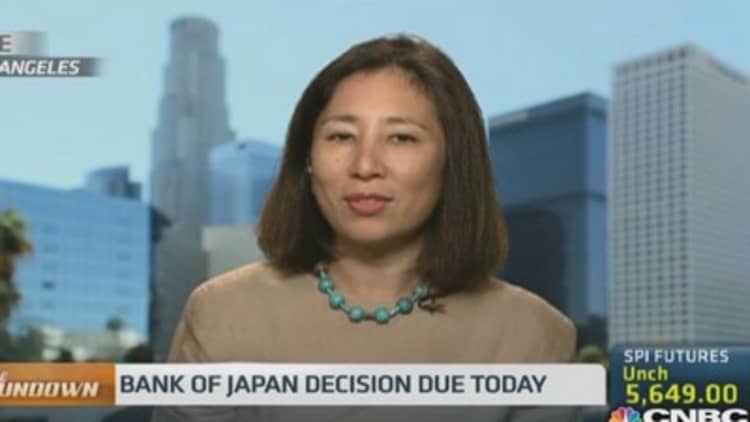The Bank of Japan will maintain its massive monetary stimulus on Thursday and argue that the bigger-than-expected hit from a sales tax rise will be temporary, despite market worries the pain inflicted may make its inflation target harder to achieve.
A recent run of weak data, including a slump in household spending and tepid factory output growth in July, has cast doubt on the BOJ's view that the economy will rebound steadily from a
severe second-quarter contraction caused by the higher tax.
Pessimists on the board may propose offering a bleaker view on aspects of the economy such as industrial output, which the bank currently describes as "increasing as a trend", sources familiar with the bank's thinking say.
Read MoreWhy Japan's economy is stuck in 'no man's land'
But the BOJ is likely to maintain its view that the economy is recovering moderately and stress that the pain of the sales tax increase is starting to ease, with consumption set to benefit from a tightening job market that is pushing up wages.
Offering some relief to policymakers, Japan's Nikkei stock average hit a seven-month high on Wednesday on hopes that a cabinet reshuffle by Prime Minister Shinzo Abe would give fresh momentum to his growth-oriented policies.
"Recent data has been pretty bad, suggesting that the economic rebound in July-September may be weaker than expected.
Read MoreJapan's Abe kicks off cabinet reshuffle
But many BOJ officials seem to feel the effect of the sales tax hike will be temporary," said Junko Nishioka, chief economist at RBS Securities Japan.
"Of course, if the pain from the tax hike lasts much longer than expected, the BOJ may ease further. Governor (Haruhiko) Kuroda has said the BOJ will act if needed. But that's only central bank rhetoric, so him just repeating the view won't necessarily signal the bank's readiness to ease policy soon."
The BOJ's optimism, however, contrasts with growing doubts among private-sector analysts that the economy can grow strongly enough to see consumer price inflation - now around 1.3 percent
- accelerate toward the central bank's 2 percent target.

At the two-day rate review ending on Thursday, the BOJ is expected to leave unchanged its policy framework, under which it has pledged to increase base money by 60-70 trillion ($571-$666 billion) per year via aggressive asset purchases to reflate the long-moribund economy.
Wage signals
Japan's economy shrank by an annualized 6.8 percent in the second quarter, more than erasing a first-quarter surge in the run-up to the sales tax increase. Analysts polled by Reuters expected a 3.8 percent bounce this quarter.
The BOJ is likely to cut its economic growth projection for the current fiscal year when it reviews its long-term forecasts in October. But it still expects the economy to ride out the tax rise and recover enough to meet its 2 percent inflation target sometime in the next fiscal year starting in April.
Read MoreAbenomics approaches a moment of reckoning
Kuroda, unfazed by the second-quarter contraction, has stressed the recovery remains on track and that Japan is making headway in meeting the price target. He is likely to stick to that message at a post-meeting briefing on Thursday, analysts say.
Sources have told Reuters that the BOJ is likely to keep its bullish price forecasts even if it cuts its economic growth forecast in October.
Behind the BOJ's optimism is a steady improvement in job and income conditions. The jobless rate is at levels the BOJ sees as approaching full employment and job availability is at a 22-year high.
Read MoreJapanese regular pay and bonuses rise in July
Summer bonuses jumped in July and basic pay rose for the second month after falling for more than two years, data showed on Tuesday, supporting the BOJ's argument that rising household income would underpin consumption and help nudge up inflation.
Under its "quantitative and qualitative easing" program launched in April last year, the BOJ pledged to achieve its 2 percent inflation target in roughly two years, in an economy that has languished during 15 years of deflation.
Despite repeated reassurance by Kuroda that Japan is on track to meet the price target, many private-sector analysts doubt inflation will accelerate to 2 percent next fiscal year.

